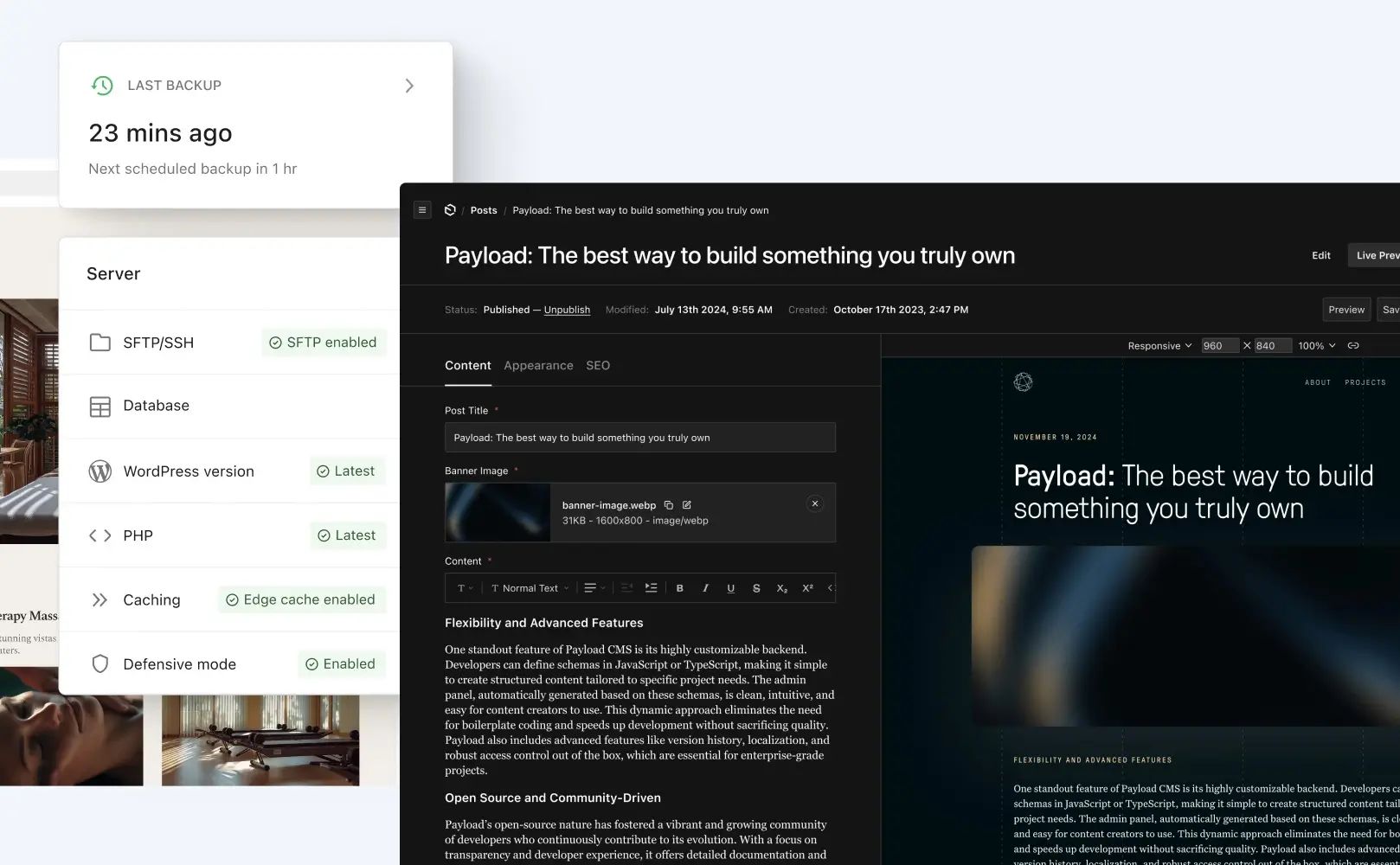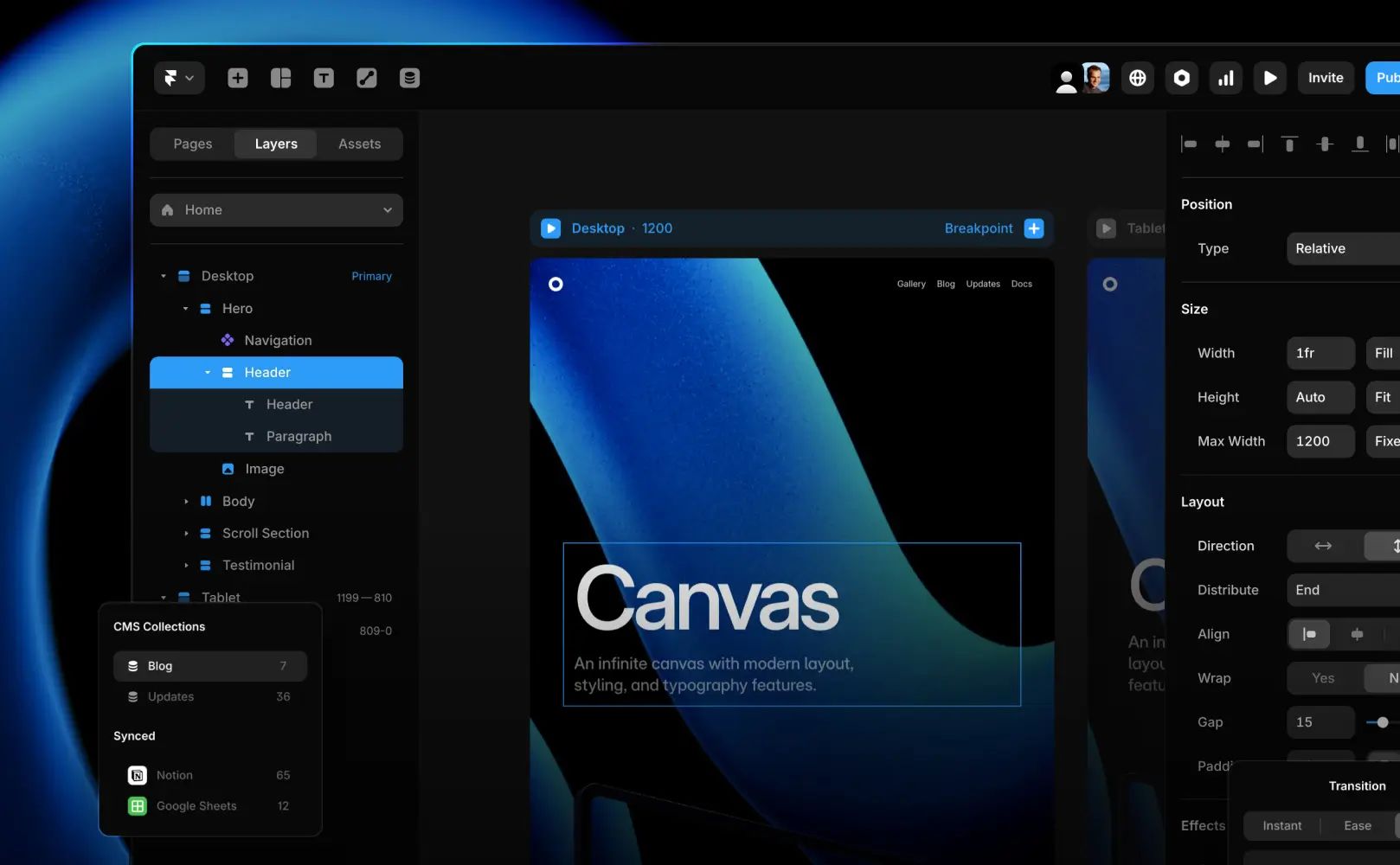
Each project comes with it's own unique set of requirements, but choosing the right foundational strcuture and framework is one of the most important decisions you'll make for your business website.
WordPress development experts would recommend do build everything in WordPress and Webflow experts will recommend to build everything in Webflow. However, every project use case is different and a professional experienced web development agency will discuss with you all options and help you select the right one.
In this article we look at the two most popular options, one being in the industry for over decade (WordPress) and other modern but promising (modern headless CMS). We'll also look at the use case of headless CMS vs WordPress as well as the some of the key decision factors, such as price and maintenance.
How WordPress works
WordPress is an open-source content management system (CMS) that powers millions of websites worldwide, including NASA and White House. It provides a user-friendly interface to create, edit, and manage blog content once the front-end is set up correctly. WordPress website designs work themes or page builders. You can purchase pre-existing themes and install on your WordPress, build your own or use a WordPress page builder to build a custom design without heavy coding work.
WordPress is a 'Monolithic' structure which means, your data (blog posts, page content, etc) and your front-end of the design (theme / public facing site) all live in one single install. This can make websites a bit slow at times. However, professional WordPress development agency knows how to perfectly optimize WordPress for high-performance. With advanced caching, asset optimization and high-performance hosting, WordPress sites can out-perform competitors.
The designs are complete customizable with modern WordPress page builders as well.
WordPress require you to host the website on a web hosting space which can be anything from $5 to $20 per month.
Benefits of using WordPress as CMS
Highly customizable, easy to use and has a large community and eco-system of tools and plugins. Self-hosted so you own your data, backups and everything on the website.
Cons of using WordPress as CMS
WordPress is open-source, free to use which means everyone has started using it but very few agencies and developers know how to perfectly optimize WordPress. When an unprofessional inexperienced WordPress developer will build a site for you, they may not know how to optimize or even custom-design it. That can leave some businesses think that WordPress is a poor solution, however in reality WordPress is an open engine and the performance and design of a WordPress site completely depends on the WordPress developer not the platform itself.
This means, a perfectly optimized WordPress website requires expert WordPress development skills and WordPress agency with years of experience in web development and WordPress CMS.
What is a headless CMS and how does it work
Modern headless CMS work differently to 'Monolith' WordPress or other traditional CMS. Headless CMS separates the backend (where content such as blog content, etc are created and stored) from the frontend (where content is displayed).
Unlike WordPress CMS, where backend content is tightly connected to the website’s design and frontend, a headless CMS delivers content through an API or GraphQL. This means the same content can be published across websites, mobile apps, digital displays, or any other platform without being tied to one presentation layer.
In simpler words, Headless CMS is called headless because it doesn't have a front end and it works solely for purpose of data architecture and storage, with flexibility to have any frontend (Website, App, etc) connected to it.
Benefit and use case of a headless CMS
Besides being 'modular' headless CMS also has a lot better security than traditional WordPress like CMS. Since the data is passed through API calls, the backend does not impact the performance of the frontend (public facing) of the website at all.
Other significant benefit of such modular approach is that with headless CMS you can connect multiple services. For example you can connect a translation tool to your headless CMS, that does content manipulation in the backend then passes final content through single API call to the front end, without impacting the front-end performance.
Cons of using headless CMS
Even though it opens a lot of possibilities and flexibility, managing headless CMS and setting them up require some level of expertise. Headless CMS also are more pricey than traditional CMS hosting. Alternatively some headless CMS are open source which means you can self-host them, however that would require you to have knowledge of maintaining a server and the self-hosted CMS as well.
At Sundeck studio we have great expertise in managing these for various clients, however we recommend using headless approach only for large-scale sites with complex data structures or large amount of data, where you actually benefit from the modular architecture.
Major differences between a Headless CMS vs WordPress CMS
WordPress | Headless CMS | |
|---|---|---|
Being used since | 2003 | ~2020 |
Average price to host (per month) | ~$5 to $20 | Cloud hosted ~$300 |
Maintenance | Required | Not required for cloud hosted and heavlily required for self-hosted |
Security | Requires setup and continous updates | Highly secure in most cases |
Customization | Customizable with plugins | Highly customizable and modular |
Integrations | Possible but adds load to the WordPress install | Possible without causing load to CMS |
Data | Data owned by you or your hosting provider | Data owned by CMS cloud provider or you if you self-host |
Performance | Requires good setup | High performance out of the box |
Use case | Great for medium scale websites | Great of large scale platforms with complex data structures |
Support | No | Yes |
What are the best headless CMS
There are plenty of headless CMS in the market, both open source and closed, license based and one-off payment based. Some of the most popular headless CMS are:
- Payload (Open-source. Cloud-based version is now owned by Figma and closed to public)
- Strapi (Offers both, open-source and cloud-based managed service)
Which CMS is right for your business
Looking to get a small business website design? Go with something simpler such as WordPress or others. However, if you have a large scale site, muliple categories, interconnection between products, posts, pages, categories, alot of dynamic data linking or services to integrate, think towards choosing a good Headless CMS.
Need support in making the right decision? Book a free chat with us.








